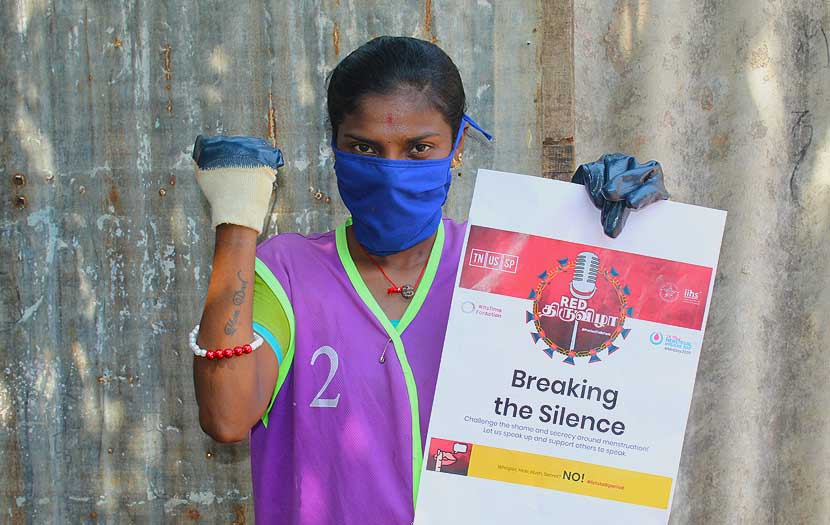Menstruation is concomitant with womanhood. Nevertheless, in my adolescence, I was taught to deal with this as a taboo subject. But, that was a while ago. What is the situation now? How does the modern adolescent girl, in this age, deal with this inevitable body function? Has the silence around ‘those five days’ been broken? It was with these thoughts that I embarked upon a study to explore what adolescent girls in small towns think of menstruation, and how to deal with it.
Recently, I happened to chat with a bunch of 12-14- year old girls about menstruation, and what they thought about it. The girls were shy and uncomfortable in the beginning. Gradually, they began to open up and what followed was a very engrossing discussion. Every single girl in the group had something to say from her own personal experience. While many of the stories sounded similar, a few were rather unusual.
When I was growing up, despite the silence and the taboo, my mother had taken care to introduce the concept of menstruation to me. When I attained menarche, I was mentally prepared to handle it. Contrary to what I had experienced, most of the girls I spoke to practically had no information about menstruation from their mothers. On the other hand, many of them had been told that they had to inform an aunt or an elderly woman in the neighbourhood at the onset of their first period. It was a popular belief that informing the mother or the grandmother would bring bad luck to the girl for her entire life. The girls also said that during the course of their first period they were made to sit on a wooden plank in a secluded area of the house for a period of 7 to 10 days. Some of them were also made to remain there for as long as two weeks. Once the period of seclusion was over, some families celebrated the occasion with a grand ceremony to which neighbours and relatives were invited.
However, once this celebration was over, the girls were not expected to speak about their periods openly even with their own mothers. Their monthly cycle was to be ‘suffered’ in silence, because of which girls got the basic information from their peers, who were as ill-informed as themselves. This had resulted in a variety of misconceptions around menstruation and menstrual hygiene.
The girls also reported that several restrictions were imposed on them during their monthly menstrual cycle. They were prohibited from attending any religious festivals, going to the temple, prevented from entering the kitchen or hanging out with their friends and family members. Some of them were even prevented from eating certain kinds of foods.
“During my periods, my family behaves like I have got a contagious disease. I am not even allowed to touch anyone else,” said one girl, while some others reported that they had to refrain from eating some kinds of foods. Anything sweet was forbidden because it was popularly believed that eating sweets would result in increased blood flow, which would be detrimental to the health of the girl.
Attending school during the menstrual cycle continued to be a nightmare, with problems being faced at every stage from travelling to school to concentrating in the classroom to changing sanitary pads. “Taking a sanitary pad out of my bag, carrying it discreetly to the toilet and safely disposing of the used pad, is not at all easy,” said one girl. Her story reminded me of my school days.
While government schools have made a small attempt to make girls comfortable during their monthly cycle by offering them six packets of free sanitary napkins each month, the girls were not comfortable using them. “These pads are not very absorbent,” they said, adding that most of them took the packets and gave them to their mothers, who used them along with the usual cloth. The girls, on the other hand, preferred to use branded sanitary pads, which they got from the local pharmacy.
Home remedies were still the most popular form of treatment to deal with problems and discomfort associated with menstruation. Most of the girls said that they had never thought of consulting a physician for any period-related discomfort like stomach aches or cramps. Coconut oil, turmeric powder, fenugreek seeds, castor oil etc., continued to be the sought-after remedies during those five days. Superstitious beliefs continued to thrive around everything related to menstruation, some of them even leading to unintended good. “My grandmother says if I don’t dispose of the used napkin properly I will get Naga Dosha,” said one girl to my amusement. At least proper disposal was being taken care of, I thought.
As the discussion came to a close, I realised that taboos and irrational fear continued to abound around everything related to menstruation. It is very important that girls are not only educated about menstruation and menstrual hygiene but also to be given lessons that would trigger a positive perception about their monthly period, thereby boosting their self-esteem. Parents, especially mothers, had to be brought into the ambit of discussion and talking about menstruation and menstrual management had to be encouraged.
Once the ignition is switched off, we watch in amazement at Kumar’s metamorphosis. He is no longer the chatty person who was sitting beside us behind the wheel. He jumps down from the driver’s cabin, reaches the septic tank and breaks open the sealed manhole with a crowbar. In an equally well-coordinated move, Muthu pulls down the extension hose from the top of the truck, connects it to the valve embedded on the tanker, and pushes the other end into the septic tank. Thanks to the vacuum suction technology, the vacuum tank is filled with 5000 litres of septage in a few minutes. Throughout the entire process, Kumar has kept a careful watch on the volume gauge mounted on the tanker.
While this entire exercise is taking place, Suresh and I introduce ourselves to the staff of the poultry farm. After some initial hesitation, some of the workers began speaking to us. We get to know that close to 90 workers work and live on the poultry farm. They share common sanitary facilities, which are spread around the farm, and on an average around 15 lorry loads of septage was being generated by the farm every month. Our jaws drop on hearing this number. “Where do they take so much septage? What is the disposal mechanism,” was the question on our minds. We keep a straight face and ask Kumar where the nearest dumping location was. “Oh, I have an arrangement with the nearby farmland,’’ he says confidently. “We will go there in a while,” he adds.
Surely enough, half an hour later we are at a large coconut grove. With the farmer’s wife supervising the unloading, Kumar and Muthu empty the entire tanker into the groove. We take the opportunity to speak to the farmer’s wife. She tells us that her farm receives around 20 loads of septage every couple of months. “It is not only from the poultry farm, we have an arrangement with a couple of other places for regular supply of septage,” she says with a smile. Her husband who had joined her tells us that the septage is very important during dry spells when the farm faces acute water scarcity.
Soon it is time for lunch. The owners of the farm invite Suresh and me to join them for lunch. Kumar and Muthu have brought their lunch along with them. They go to a nearby tap and begin washing up. I watch as Muthu fumbles around in the driver’s cabin and pulls out a used detergent soap wrapped in a newspaper, which he and Kumar use to clean their hands and feet. The sight is a kind of relief for us, as we had observed the two carry the hosepipe from one septic tank to another on their shoulder, wiping the spillage with their bare hands!
Once lunch is done, the work continues. Kumar and Muthu take turns building mud bunds around the coconut trees, with their bare hands, to prevent spillage and overflow. The farm owners’ small children continued to play in the vicinity. One toddler keeps coming to Kumar and Muthu and the duo keep embracing him, carrying him, playing with him throughout the time they are working.
It is late in the evening, when the work is done. It is time to head home. On our way back, we find out that both Kumar and Muthu had dropped out of school and taken up this profession. Kumar earns close to Rs 17,000/- per month, while Muthu earns Rs 12,000/- .
As we near Coimbatore, we stop at a roadside teashop. “Take that smelly truck away,” someone shouts from inside. We look at Kumar. He has a defiant look on his face, but his voice trembles as he says, “There is no point in getting into a brawl. This is our profession and we are proud of it.

S. Elizabeth Prasanna
Social Worker, Keystone Foundation


Leave A Comment
You must be logged in to post a comment.